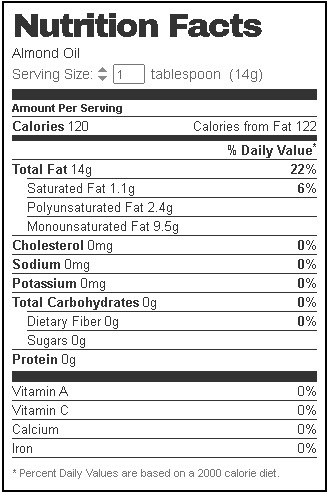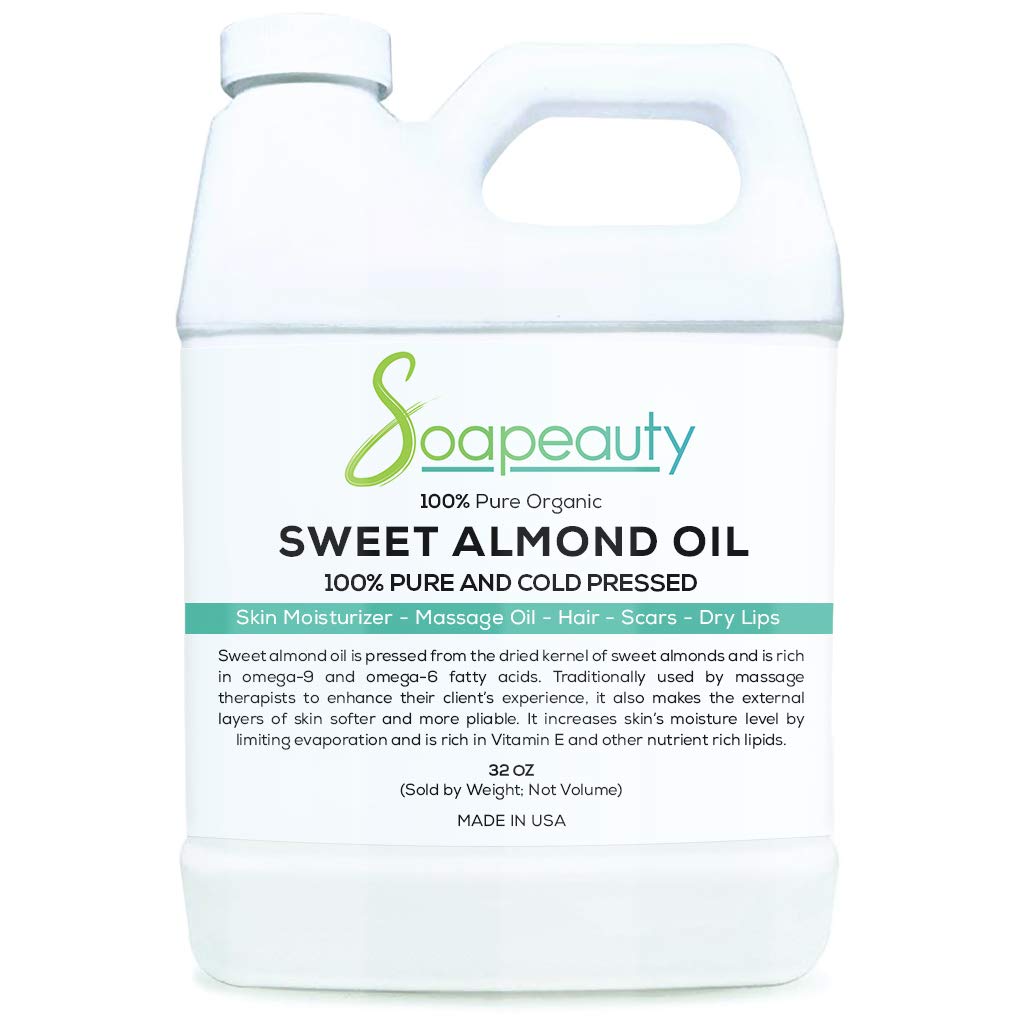
If you eat almond oil, you’ll also get some nutritional benefits. This oil contains a modest quantity of saturated fat. Saturated fats have been demonstrated to boost “bad” cholesterol levels and may play a role in heart disease. According to the American Heart Association, choose oils with less than four grams of saturated fat per tablespoon. Each tablespoon of almond oil contains roughly one gram of saturated fat.
Almond Oil Nutrition Facts
Fats
This oil contains a modest quantity of saturated fat. Saturated fats have been demonstrated to boost “bad” cholesterol levels and may play a role in heart disease. According to the American Heart Association, choose oils with less than four grams of saturated fat per tablespoon, and each tablespoon of almond oil contains roughly 1.1 grams of saturated fat.
When you take a tablespoon of almond oil, you’ll get over 1.1 grams of polyunsaturated fat. Polyunsaturated fatty acids, or PUFAs, aid in the reduction of “bad” cholesterol, which is beneficial to cardiovascular health. Almonds and almond oil both help to increase your PUFA intake.
Carbohydrates
Almond oil contains no carbs. Almond oil has a glycemic index of 0 (zero).
Protein
Almond oil does not contain any protein, even though almonds do.
Micronutrients
Almond oil is a good source of vitamin E. When you drink one tablespoon of almond oil, Vitamin E, also known as alpha-tocopherol, is a fat-soluble vitamin that aids in cell metabolism and is thought to have anti-aging properties. This crucial vitamin may also aid in the prevention of diseases including cancer, heart disease, cataracts, and diabetes.
What Are the Benefits of Almond Oil?
Almond oil’s vitamins and antioxidants may give essential health benefits. Vitamin E, for example, is an antioxidant that protects cells from free radical damage. Excessive free radicals can result in oxidative stress, which has been associated with the development of chronic and degenerative diseases such as rheumatoid arthritis, cancer, heart disease, and cardiovascular disease.
Almond oil also can provide other benefits like:
Heart Health
Almond oil’s monounsaturated fats are heart-healthy and a superb option for saturated-fat oils. Monounsaturated fats can improve your circulatory system and heart by lowering the quantity of “bad” LDL cholesterol and total cholesterol. Almond oil also contains vitamin E, which helps to improve heart and cardiovascular health by lowering LDL cholesterol oxidation.
Blood Sugar Levels
Almond oil, which is high in monounsaturated and polyunsaturated fats, has been shown to help people with type 2 diabetes control their blood sugar levels. According to one study, participants who consumed almond oil with breakfast had lower blood sugar levels after eating and throughout the day than those who did not consume almond oil. After eating, they were also less hungry, resulting in less food consumed throughout the day.
Skin and Hair
Almond oil’s hydrating characteristics might help reduce irritation and soothe your skin. According to research, topically using almond oil in a cream can help relieve eczema and dermatitis symptoms. Almond oil may also help improve the complexion and tone of your skin.
Although additional research is needed, almond oil may help hydrate and strengthen your hair and scalp, and it may aid in controlling frizz and hydration and healing dry hair. Almond oil may also aid in the relief of dry, itchy scalp symptoms.
Sweet Almond Oil Organic Cold-pressed Unrefined
Features:
Should You Cook With Almond Oil?
If you eat almond oil, your heart will thank you. High in monounsaturated fatty acids, Almond oil can help raise “good” cholesterol levels or high-density lipoproteins (HDL). When saturated and trans fats are replaced, they can lower “bad” cholesterol or low-density lipoproteins (LDL).
Because of its high quantities of antioxidants, capacity to reduce inflammation in the body, and influence on cholesterol, almond oil can help reduce the risk of cardiovascular disease. Remember to maintain unrefined or virgin oils at low heat while cooking with almond oil to avoid burning the oil and losing its nutritional content. Almond oil is best used for salad dressing, low-heat baking, or finishing oil to give flavor and nutrients to a dish.
Its mild flavor makes it ideal for incorporating into recipes. Because refined oil has been prepared to tolerate a much greater heat, up to 420°F (215°C), it can be used for roasting or sautéing.
How to Prepare Almond Oil?
Almond oil has a mellow, nutty flavor that goes well with various cuisines. Because it doesn’t have a high smoke point, unrefined almond oil works well as a finishing oil that you add to your food after cooking. Cooking procedures such as sautéing and roasting can be done using refined almond oil.
However, because high heat during the refinement process can destroy nutrients, refined almond oil may not have as many natural nutrients. If you have a nut allergy, you should stay away from the almond oil. You can use almond oil in your beauty routine as well. It’s a non-toxic, natural ingredient found in various over-the-counter beauty products. A tiny amount can be rubbed into your skin, scalp, or curly hair. You can also use essential oils as a carrier oil if you’re using essential oils.
Here are some ways to use unrefined and refined almond oil in recipes:
- Drizzle a bit of unrefined almond oil over pasta to increase healthy fats and flavor.
- Use unrefined almond oil as the base for homemade salad dressings by combining it with herbs and apple cider vinegar.
- Use it as a dipping oil for bread.
- Use refined almond oil to stir-fry or sauté vegetables, which can add a nutty flavor to your dish.
What Are the Side Effects of Almond Oil?
You should avoid almond oil if you have a nut allergy, specifically an almond allergy. Almond oil may contain allergens from almonds.
According to the American Academy of Allergy, Asthma, and Immunology (AAAAI), depending on the technique of manufacture and processing, tree nut oils may constitute a hazard. This includes applying the oil to the skin, inducing an allergic reaction.
However, the specialists at AAAAI point out that almond oil reactions are incredibly unusual (the organization’s website lists none). “Because almond oil can include almond allergens, and finally because we know cutaneous sensitization can occur,” they say, “I would think the wisest thing to do is avoid almond oil totally if a patient has exhibited allergy to almond oil.”
Conclusion
Almond oil is a flexible lipid used in cooking or as a natural cosmetic. Almond oil may help you maintain a healthy weight by promoting heart health, stabilizing blood sugar levels, preventing free radical damage, and promoting heart health. Additionally, the oil is an excellent moisturizer for both skin and hair, and it may even help prevent stretch marks and protect your skin from sun damage.
Unrefined almond oil has more nutrients and is healthier for cooking than refined almond oil. Just be careful not to overheat it, as this would destroy some of the nutrients. Regardless of how you use it, this intriguing oil is an excellent addition to your pantry and vanity.



